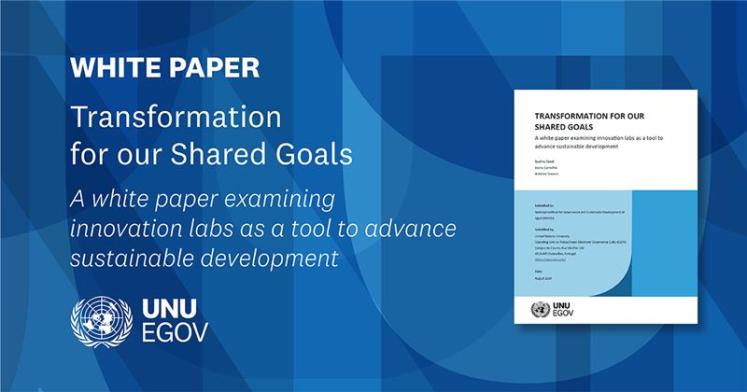UNU-EGOV launches its latest white paper, “Transformation for our shared goals”, co-authored by Bushra Ebadi (UNU-EGOV Research Associate), Joana Carvalho (UNU-EGOV Senior Research Assistant) and António Tavares (UNU-EGOV Adjunct Associate Professor).
The paper was commissioned by the Egyptian National Institute for Governance and Sustainable Development (NIGSD) with funding from the Spanish Agency for International Development Cooperation (AECID) to support the Egyptian government’s efforts in developing an innovation lab pilot.
Governments worldwide are facing increasing challenges in meeting the needs of their populations. These challenges are exacerbated by converging crises, including climate change, pandemics, public health emergencies, rising economic inequality, racial and social discrimination, and political instability. As a result, there is an urgent need for transformative policies, services, and governance models to address these issues, rebuild trust with citizens, and meaningfully promote sustainable development.
While the digitization of public and private services is often seen as a solution, its benefits are not equally distributed. Marginalized communities frequently face negative consequences, such as digital exclusion, due to persistent digital divides and weak governance structures. Despite the widespread adoption of digital technologies, progress toward achieving the Sustainable Development Goals (SDGs) has been limited, suggesting that technology alone cannot resolve complex global challenges.
To effectively support the realization of the SDGs, digital efforts must be accompanied by broader systems transformation, innovative governance practices, and enhanced community engagement. Innovation labs have emerged as valuable platforms for experimentation and collaboration, helping governments and other stakeholders test new approaches and strategies. These labs vary significantly in terms of structure, funding, and goals, reflecting diverse local contexts and priorities.
The paper provides an overview of the role of innovation labs as a tool in advancing sustainable development with case studies from innovation labs in Armenia, Lithuania, Morocco, Portugal, Spain, Switzerland, and Tunisia, highlighting key projects, challenges, and success factors.
Based on their research findings, the paper’s authors advocate for the adoption of a more equitable, values-based approach to innovation, specifically identifying an integrated intersectional, decolonial, and community-led approach to innovation and research as integral to better promoting sustainable and equitable development.
Overall, the paper aims to deepen NIGSD’s and other public sector actors’ understanding of innovation labs as a specific tool and/or modality used by various stakeholders to promote and advance sustainable development.
The full report can be downloaded on UNU Collections.


